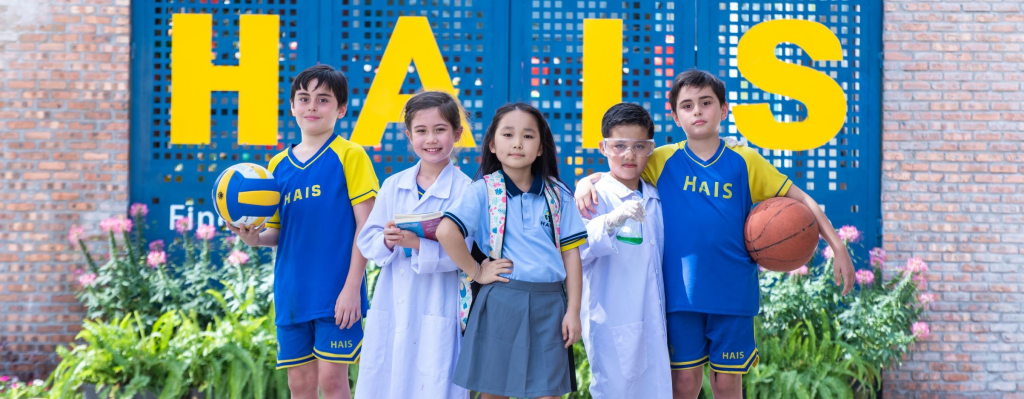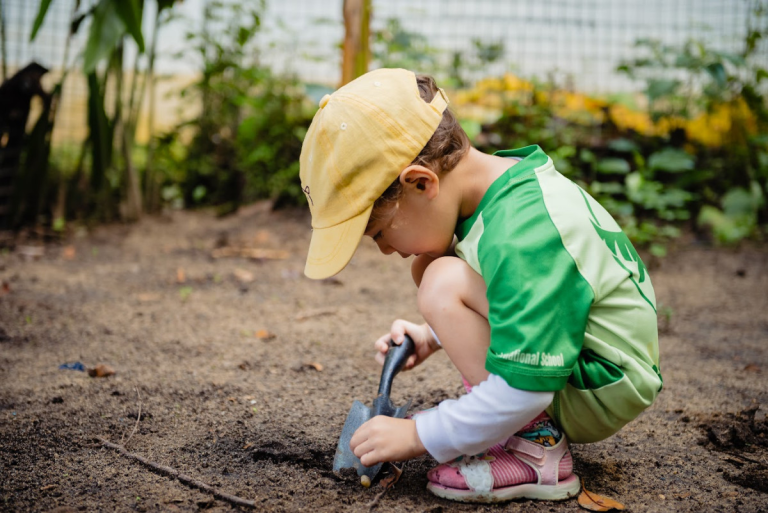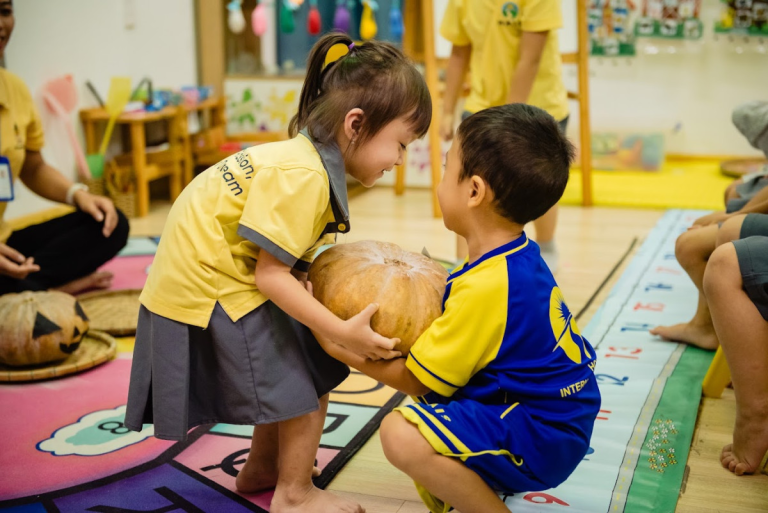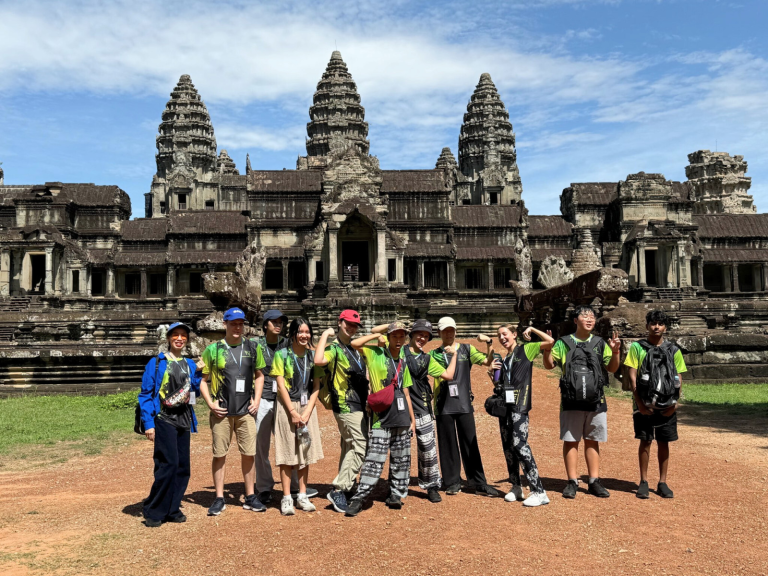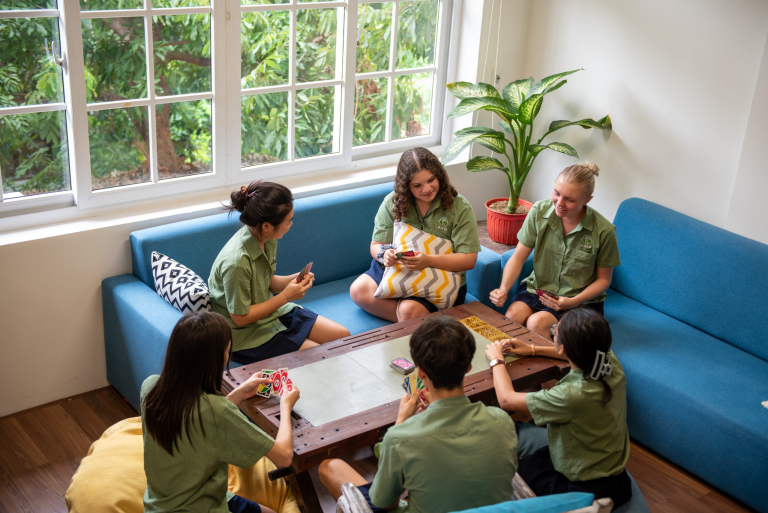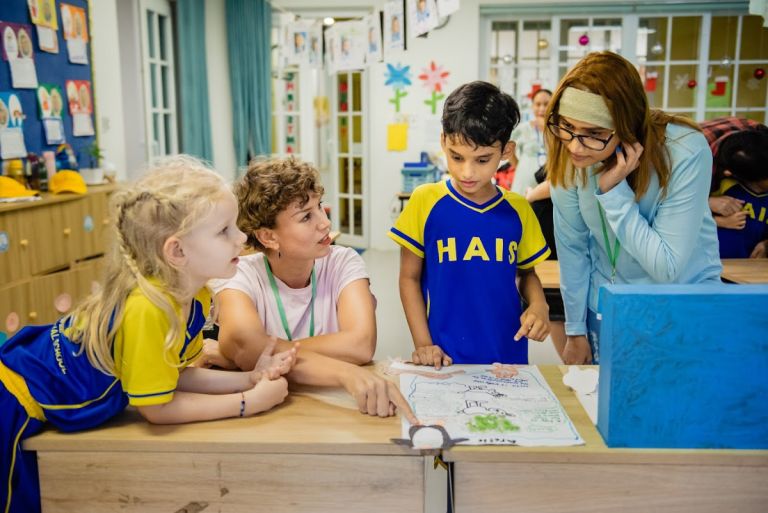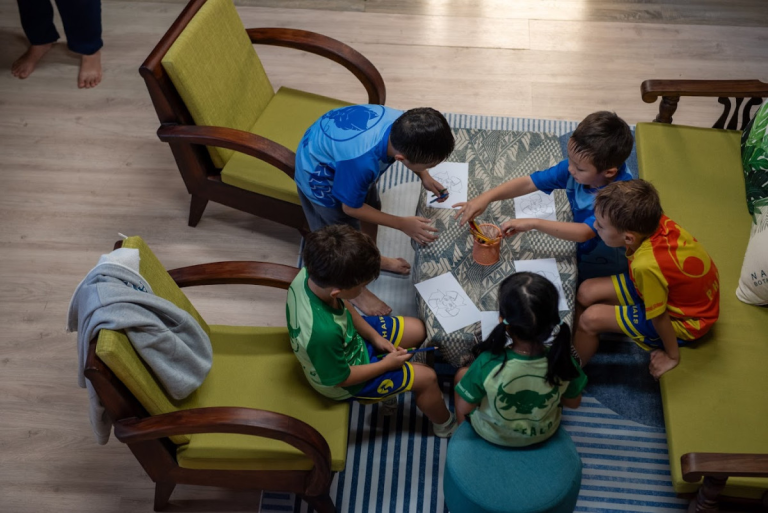Lower Secondary
Lower Secondary
Cambridge programmes and qualifications set the global standard for international education. They are developed by curriculum experts, rooted in academic rigour and informed by the latest educational research. At HAIS, our teachers are experienced in delivering the best possible education and use the Cambridge pathway. The curriculum frameworks provide comprehensive learning objectives. These frameworks are built on the Cambridge Primary Programme and enable smooth progression to the Cambridge Upper Secondary programme.
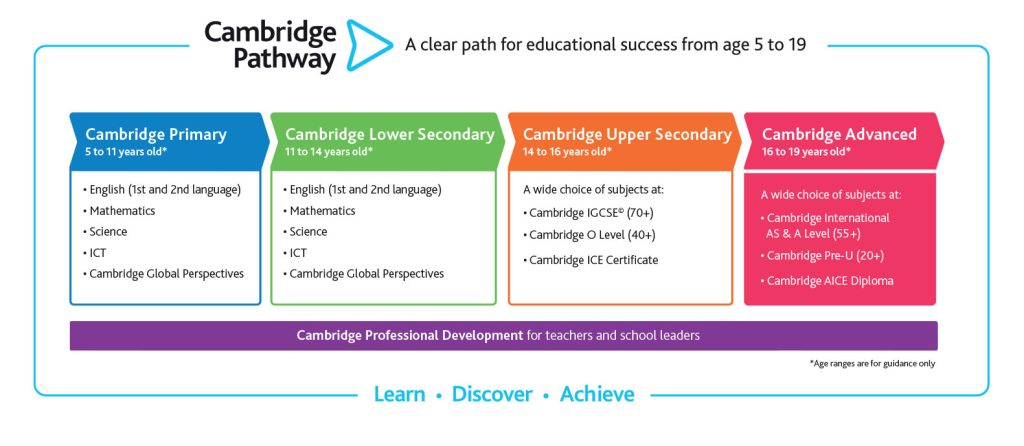
Core Subjects
English Language | English Second Language
English Language or English as a Second Language (ESL)
Students develop English skills that they can apply to a variety of purposes and audiences. They learn to communicate effectively both orally and through written forms. Students also develop the critical skills necessary to engage with a variety of information, media, and texts with understanding and enjoyment.
What will students learn?
Divided into three stages, the curriculum framework encompasses knowledge, skills, and in-depth understanding across three areas:
- Reading
- Writing
- Speaking and Listening
Mathematics
In Mathematics, students develop reasoning and analytical thinking skills. The curriculum focuses on principles, patterns, systems, functions, and relationships to enable students to apply their mathematical knowledge and develop a comprehensive understanding of the subject. Students are encouraged to think and do mathematics by discussing ideas and providing evidence to support their solutions and reasoning.
What will students learn?
Mathematics is divided into the following subject areas:
- Number Sense
- Algebra, Geometry, and Measurement
- Statistics and Probability
Sciences
Scientific Inquiry is the process of examining ideas, evaluating evidence, designing investigations, collecting and analysing data. The aims of the Science inquiry strand are to provide a foundation for Biology, Chemistry and Physics, focusing on developing confidence and a passion for scientific knowledge, including an awareness of the environment and the history of science.
Students develop research, collaboration and creativity skills that will be useful in many aspects of their learning and future development, and the course supports progression to a range of science subjects in the Cambridge International Secondary 2 programme.
The Cambridge Secondary 1 Science curriculum covers four content areas:
- Scientific Discovery
- Biology
- Chemistry
- Physics
Non-Core Subjects
PSHE
The Health Promotion course is a vital part of our educational programme. This initiative aims to provide valuable education on various aspects of health, personal and social development, aligning with our school values.
Why is this course important?
The Health Promotion course has been carefully designed to equip our students with the knowledge, skills, and attitudes necessary to lead healthy, safe, and fulfilling lives. As our world becomes increasingly complex, it is essential that our students are prepared not only academically but also in terms of their physical, mental, and emotional well-being. This course addresses critical areas such as mental health, physical health, relationships, personal safety, and responsible citizenship.
Digital Literacy
Digital technology is an essential skill for learners of all ages, including secondary school students. The digital world allows us to connect, collaborate, innovate, and explore new information on an ever-increasing scale. Learners must be able to use technology effectively from the very beginning of their learning journey.
Developing digital technology skills will benefit students in many aspects of their learning and preparation for the future.
What will students learn in this course?
- Understand their own and others’ positions in a connected world and make informed decisions about the information they encounter online.
- Develop knowledge and understanding that will enable them to respond to and assess future technological situations.
- Develop the skills to create documents and presentations in a proficient and polished manner.
- Learn to become positive contributors to the digital world.
- Use digital technology safely, protecting their own physical and emotional health.
History
At HAIS, the History subject in the Secondary School block focuses on helping students develop knowledge and understanding of both British and world history. The subject is designed to arouse students’ curiosity in learning more about the past. Students will develop their ability to ask deep questions, think critically, analyze dialectically and argue, and build their own awareness and judgment. History also helps students understand the diversity and challenges of human life, change, the differences between different societies and groups of people, as well as understand their national identity and the challenges they have faced throughout the ages.
Drama
Drama is both a creative subject and also improves communication, promotes literacy, improves story recall, and generally assists with public speaking (a skill required in all manner of jobs later in life).
Students will learn:
- Communication skills (voice and tone, facial expressions, body language, speech enunciation and pronunciation);
- Public speaking skills;
- Creative thinking and problem solving through scenery building, prop creation, costume design, and improvisation;
- Confidence such as delivering lines on stage, handling unexpected situations promptly and effectively;
- Commitment. Putting together a show can take weeks, and it’s important for everyone involved to follow the production through from beginning to end. Even short practices in drama class require the performers to stay on task throughout the scene; and
- Cooperation and collaboration. Drama class is very much a group effort. You’re not putting on the production alone. Rather, you must work closely with everyone in the performance including the other actors, directors, musicians, and backstage crew.
Art and Design
This subject provides students with a foundation for self-expression, igniting their imagination, creativity, and developing transferable and practical skills. Students explore and broaden their worldview to become critical thinkers, self-reflective and decisive learners. They also learn to articulate their personal responses based on their experiences and knowledge.
What will students learn?
- Developing creative skills will help with many aspects of learning and future development.
- Learning to see oneself as an artist, enhancing self-reflection and independence.
- Developing the skills necessary to express creative ideas and communicate visually.
- Recognizing one’s position and empathizing with others in a world of creativity, innovation, and connection.
Physical Education
Physical Education is an essential component of a balanced curriculum. Regular physical activity has been shown to improve both physical and mental health, and there is a growing body of evidence that physical activity can also improve academic performance across all grade levels.
Students develop skills through a variety of age-appropriate physical activities, including games, team sports, gymnastics, swimming, and dance.
What will students learn?
- Increase self-confidence, movement, control, and mastery of a variety of skills.
- Improve understanding of concepts, rules, tactics, strategies, and interactions.
- Participate in a respectful and responsible manner, appropriately and safely.
- Develop knowledge and understanding of how physical education can build healthy and active lifestyles.
- Develop transferable skills that promote physical, cognitive, and social development and become motivated learners and independent, critical, and reflective thinkers.
Music
Music nurtures creativity and builds confidence. This subject helps students express themselves and shows the importance of communication as they learn to connect with other artists and with audiences.
Students explore music as artists, composers, and music lovers. They perform, understand, and appreciate music from different cultures, times, and places, helping them develop leadership and collaboration skills, as well as boosting their self-confidence.
What will students learn?
- Nurture a love of music through meaningful and engaging experiences.
- Develop the knowledge, skills, and attitudes necessary to help them grow as true artists.
- Collaborate with others in a purposeful, expressive way through singing and playing music.
- Nurture individual and collective creativity.
- Use their acquired knowledge to explore and create music in a unique, relevant, and valuable way.
World Languages
English as an Additional Language (EAL)
Our HAIS World Languages programme runs from Year 2 in Lower Primary through Year 9 in Lower Secondary. World Languages EAL is not an elective option. Students requiring additional English language support must attend the EAL classes. This is to ensure each child can access the academic content in their learning, which becomes progressively more challenging as they move to the next level of learning. The need for EAL support is generally identified during the admissions assessment process and our annual CEM diagnostic testing. We also consider a student’s progress in English during our normal English class provision and end-of-term assessments.
HAIS EAL classes follow the Cambridge Curriculum Framework for Primary or Lower Secondary English as a Second Language. Many EAL classes are co-taught and use a combination of Cambridge’s official English as a Second Language coursebooks, called Cambridge Global English, along with lessons targeted to specific areas of difficulty to enhance the effectiveness of the lessons.
French as an Additional Language (FAL)
Our HAIS World Languages programme runs from Year 2 in Lower Primary through Year 9 in Lower Secondary. French as an Additional Language is a language option intended for non French speakers who wish to learn French. With approximately 300,000 million speakers, French is the 5th most spoken language worldwide and widely popular in Vietnam. Multiculturality is an important consideration when teaching French as an Additional Language and we aim to instil an interest in a foreign culture and establish a good foundation of grammar and vocabulary through a variety of activities using the four skills of reading, writing, speaking and listening. Teachers use a range of resources suitable to the year and proficiency level.
Vietnamese as a Native Language (VNL) and Vietnamese as an Additional Language (VAL)
Vietnamese is one of the languages taught in the World Languages programme at HAIS. We offer Vietnamese as a first language and Vietnamese as an additional language.
Vietnamese as a native language is for students who have a foundation in Vietnamese and are proficient in listening, speaking, reading and writing. Vietnamese as a Native Language is mandatory for students holding solely Vietnamese nationality in order to maintain their mother tongue to meet the regulations of Circular 04 of the Ministry of Education and Training (MOET). HAIS VNL classes will be taught according to the curriculum of Vietnamese language, Literature, History & Geography in accordance with the curriculum standards of MOET and appropriate to the age and ability of the students.
Vietnamese as an Additional Language is an option for students who do not speak Vietnamese natively and wish to learn Vietnamese. VAL classes are designed to suit beginner learners, teaching all four skills of listening, speaking, reading, and writing, with special emphasis on two communication skills of listening and speaking. The Vietnamese textbooks level 1,2,3 were compiled with enthusiasm by the teachers of HAIS’s Vietnamese studies department with the aim of creating a solid foundation for beginners and arousing the interest of learners.
Commerce
Commerce equips young people with the knowledge, understanding, skills, and values they need to make informed decisions about consumerism, finance, economics, business, and employment. It develops students’ understanding of business processes and their capacity as individual consumers and financial managers.
Through the study of Business Administration, students develop awareness of consumer behavior and financial literacy, allowing them to participate in the financial system in an informed manner.
Global Perspectives
Global Perspectives is a curriculum-wide subject that focuses on developing students’ research, analysis, evaluation, communication, collaboration, and reflection skills.
At the secondary level, students develop these skills through a variety of activities and projects that focus on current global issues in a range of contexts. Learners explore personal, local, national, and global perspectives to help them understand and connect with the world around them.
These topics are similar in nature to the Cambridge IGCSE curriculum, allowing secondary schools to develop and apply extracurricular skills at an earlier age.
Study pathway
